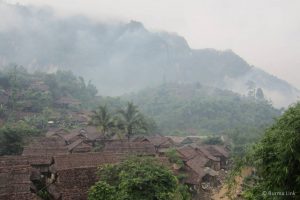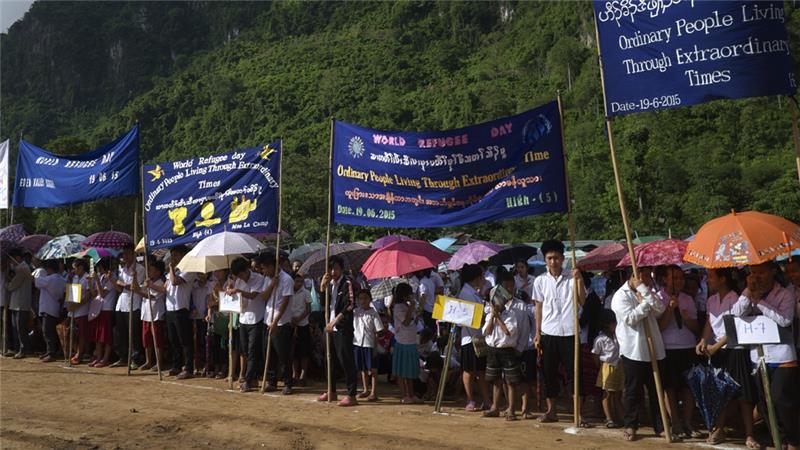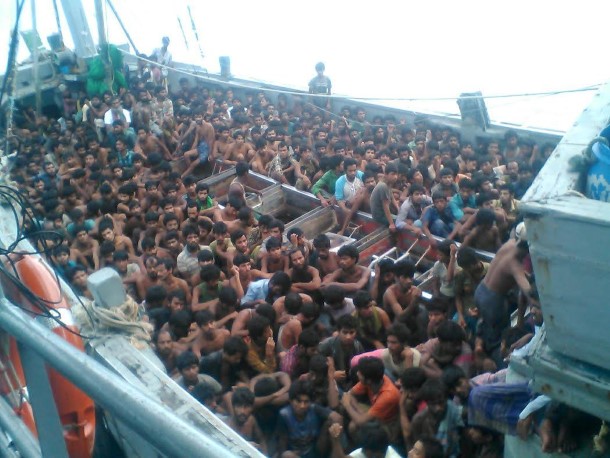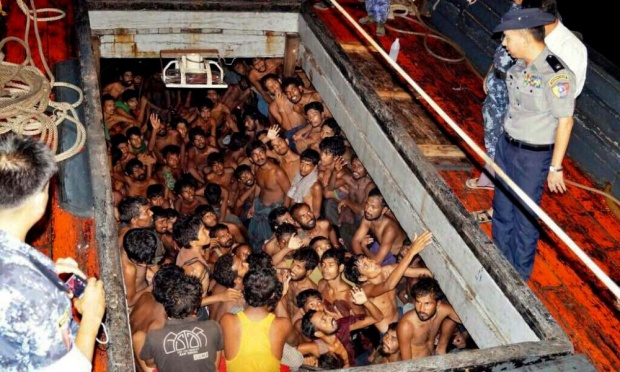Posts Tagged ‘Refugee’ (13 found)
World Refugee Day Calls for Greater Awareness of Burma’s Refugees
 20 June, 2016 marked World Refugee Day, a global recognition of the nearly 65 million people who are displaced worldwide. In Burma, the Day served as a tragic reminder of the displacement resulting from decades of civil war, state-sponsored persecution and forced relocation. According to a report released by the United Nations High Commissioner for Refugees (UNHCR), Burma is the second highest contributor of both refugees and internally displaced people (IDPs) in the Asia-Pacific region. By the end of 2015, there were 450,000 IDPs and 451,800 refugees, including the over 100,000 refugees that have been displaced in nine camps along the Thailand-Burma border.
20 June, 2016 marked World Refugee Day, a global recognition of the nearly 65 million people who are displaced worldwide. In Burma, the Day served as a tragic reminder of the displacement resulting from decades of civil war, state-sponsored persecution and forced relocation. According to a report released by the United Nations High Commissioner for Refugees (UNHCR), Burma is the second highest contributor of both refugees and internally displaced people (IDPs) in the Asia-Pacific region. By the end of 2015, there were 450,000 IDPs and 451,800 refugees, including the over 100,000 refugees that have been displaced in nine camps along the Thailand-Burma border.
As the Conflict in Ethnic Areas Continues the International Community and the Burma Government Must Respect the Rights of Refugees and IDPs
 Every year on 20 June, many refugees who have fled Burma due to ongoing conflict, persecution, and human rights abuses, mark World Refugee Day with a sense of uncertainty and anxiety towards their future. This year, as the rainy season begins, refugees along the Thailand-Burma border and Internally Displaced Persons (IDPs) in Kachin, Chin, Arakan and northern Shan States, as well as other conflict-ridden areas, face severe shortages in aid. Over 220,000 IDPs are in camps in northern Burma, while a further 110,000 refugees live in a protracted refugee situation along the Thailand-Burma border. If Burma hopes to make a genuine transition towards democracy it must recognize, respect, and protect the rights of refugees and IDPs […]
Every year on 20 June, many refugees who have fled Burma due to ongoing conflict, persecution, and human rights abuses, mark World Refugee Day with a sense of uncertainty and anxiety towards their future. This year, as the rainy season begins, refugees along the Thailand-Burma border and Internally Displaced Persons (IDPs) in Kachin, Chin, Arakan and northern Shan States, as well as other conflict-ridden areas, face severe shortages in aid. Over 220,000 IDPs are in camps in northern Burma, while a further 110,000 refugees live in a protracted refugee situation along the Thailand-Burma border. If Burma hopes to make a genuine transition towards democracy it must recognize, respect, and protect the rights of refugees and IDPs […]
ဒုကၡသည္တို႔၏အသံ – ထိုင္း-ျမန္မာနယ္စပ္တေလွ်ာက္ရွိ ျမန္မာ့ဒုကၡသည္မ်ားအေျခအေန
(၂၀၁၅ ခုႏွစ္ ဇြန္လ ၁၀ရက္) ယေန႕တြင္ Burma Link ႏွင့္ ျမန္မာ့အေရးပူးေပါင္းေဆာင္ရြက္သူမ်ား တို႕မွ ဒုကၡသည္တို႔၏အသံ – ထိုင္း-ျမန္မာနယ္စပ္တေလွ်ာက္ရွိ ျမန္မာ့ဒုကၡသည္မ်ား အေျခအေန ဟုအမည္ရွိသည့္ စာတမ္း အက်ဥ္းတစ္ေစာင္ကို ျမန္မာဘာသာျဖင့္ အင္တာနက္စာမ်က္ႏွာေပၚသို႔ ပူးတြဲထုတ္ေ၀တင္ျပထားပါသည္။ ထိုစာတမ္း တြင္ ျမန္မာႏိုင္ငံ၏ ျပဳျပင္ေျပာင္းလဲေရး လုပ္ငန္းစဥ္ကာလအတြင္း ဒုကၡသည္တို႔၏အသံမ်ား ဆက္လက္လ်စ္လ်ဴရႈခံ ေနရဆဲျဖစ္သည္ကို အဓိကထား ေရးသားေဖာ္ျပထားပါသည္။ […]
• • •A Regional Solution to the Refugee Crisis Must Address Root Causes
 On 29 May 2015, Thailand hosted the long-awaited Special Meeting on Irregular Migration to address the unfolding refugee crisis in the Andaman Sea. The talks brought together representatives from 19 nations mainly in the ASEAN region, along with delegates from the UN High Commission for Refugees (UNHCR), UN Office on Drugs and Crime (UNODC), and the International Organization for Migration (IOM). At the time of the meeting, the Arakan Project has reported that at least 6,000 refugees, mainly Rohingya, are unaccounted for and likely stranded at sea. Victims of discrimination and denied even basic human rights back in Burma, these individuals are risking malnourishment, dehydration, and abuse in order to escape repressed lives under the Burma Government.
On 29 May 2015, Thailand hosted the long-awaited Special Meeting on Irregular Migration to address the unfolding refugee crisis in the Andaman Sea. The talks brought together representatives from 19 nations mainly in the ASEAN region, along with delegates from the UN High Commission for Refugees (UNHCR), UN Office on Drugs and Crime (UNODC), and the International Organization for Migration (IOM). At the time of the meeting, the Arakan Project has reported that at least 6,000 refugees, mainly Rohingya, are unaccounted for and likely stranded at sea. Victims of discrimination and denied even basic human rights back in Burma, these individuals are risking malnourishment, dehydration, and abuse in order to escape repressed lives under the Burma Government.
As more and more refugees are rescued from the squalid conditions at sea, survivor accounts have begun to emerge. Human Rights Watch recently published accounts that detail the dangerous journey from Burma, including stories involving traffickers intentionally abusing the refugees in order to hasten ransom demands, being forced at gunpoint into departing refugee boats, and the cramped and overcrowded conditions of the boats used to transport the refugees. A 16-year-old Rohingya girl described her experience on board the refugee boat, “When I got to the big boat … I cannot explain my feeling I was so scared. We were about 16 people in one small room. The doors were always locked. The smugglers put the food and water through a small hole, we never saw them.” […]
• • •Responding To Boat People Crisis in Southeast Asia – Special Meeting in Bangkok Must Formulate a Long-Term and Sustainable Solution
(Bangkok, 28 May 2015) – On 29th May, 17 countries will come together in Bangkok for the “Special Meeting on Irregular Migration in the Indian Ocean” hosted by the Thai Government […]
• • •Fate of the Rohingya Remains Uncertain
 The UN High Commissioner for Refugees has stated there are still thousands of Rohingya and Bangladeshi refugees stranded at sea, half of whom have been confined to their boats for more than a month. Many of the refugees are facing severe food and water shortages, and rescuers from Malaysia, Thailand and Indonesia – including Sumatran fishermen who have taken it upon themselves to rescue refugees – have reported that a number of boat people are in grave condition. Meanwhile, on 24 May 2015, another mass grave containing hundreds of refugees was unearthed near one of the recently uncovered human trafficking camps in Malaysia. A number of the victims were found to be from Burma, demonstrating the desperation faced by thousands of refugees wishing to emigrate from the oppression faced back home.
The UN High Commissioner for Refugees has stated there are still thousands of Rohingya and Bangladeshi refugees stranded at sea, half of whom have been confined to their boats for more than a month. Many of the refugees are facing severe food and water shortages, and rescuers from Malaysia, Thailand and Indonesia – including Sumatran fishermen who have taken it upon themselves to rescue refugees – have reported that a number of boat people are in grave condition. Meanwhile, on 24 May 2015, another mass grave containing hundreds of refugees was unearthed near one of the recently uncovered human trafficking camps in Malaysia. A number of the victims were found to be from Burma, demonstrating the desperation faced by thousands of refugees wishing to emigrate from the oppression faced back home.
Burma’s discriminatory treatment of the Rohingya continues to fuel the refugee crisis in the Andaman Sea. Over the past weekend, President Thein Sein approved the Population Control Health Care Bill, which enshrines into law the authority for state governments to determine birth-spacing guidelines in regions that are deemed to be facing high population growth, thus potentially acting as a tool for religious and ethnic discrimination. This repressive and discriminatory bill, a component of the controversial Race & Religion Protec tion Laws, has been supported by an influential group of ultra-nationalist Buddhist monks, such as the notorious Wirathu. The group has long spearheaded the hate campaign against Burmese Muslims of which many analysts claim is politically motivated by elements within the state apparatus.
• • •Press Release: US Government Needs to Step Up to Avert Growing Humanitarian Disaster of Rohingya Refugees
(Washington DC, May 18, 2015) – Today, US Campaign for Burma calls on the U.S. government to take leadership in providing immediate humanitarian assistance to the Rohingya refugees as well as putting effective pressure on the Burmese government to end its systemic ethnic cleansing program of the Rohingya […]
• • •Burma: Action Urged On Stranded Rohingya Refugees
Christian Solidarity Worldwide (CSW) has called on the British government to press for EU Foreign Ministers meeting today to discuss the case of Rohingya refugees who are currently stranded in the Andaman Sea […]
• • •Statement of the Coalition of Young People of Indonesia for ASEAN
Dear ASEAN Community, lately we have been surprised by the news of forced migration of Rohingya people from Myanmar […]
• • •Thailand, Malaysia, Indonesia: Coordinate Sea Rescues, Protect Asylum Seekers and Trafficking Survivors
(BANGKOK)—Thailand, Malaysia, and Indonesia should immediately coordinate search and rescue operations for Rohingya asylum seekers and possible survivors of trafficking from Myanmar and Bangladesh who are stranded at sea, Fortify Rights said today […]
• • •








 All posts
All posts